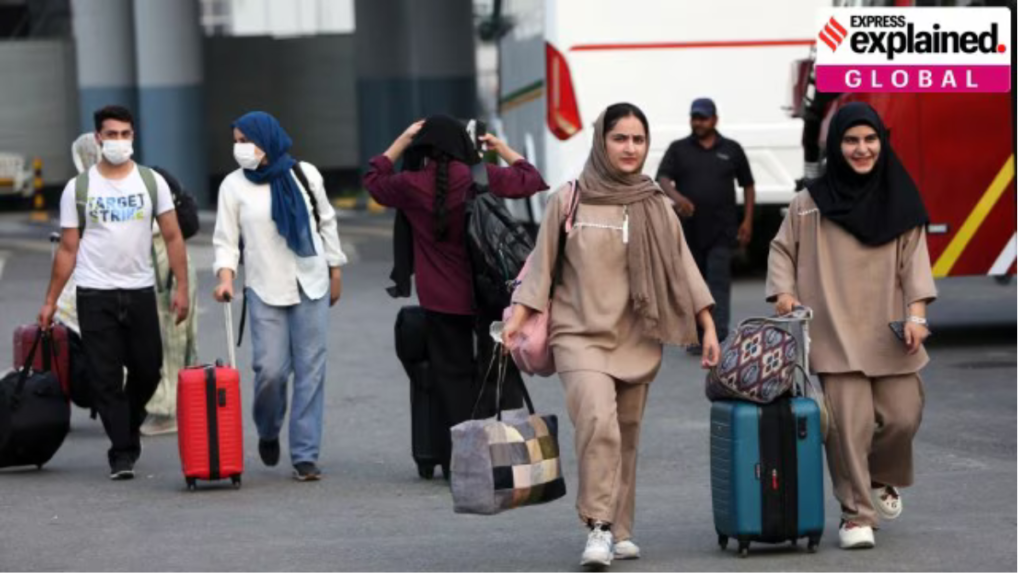Kashmiri students continue to choose Iran as a destination for medical education, even as tensions in the region and government evacuation efforts bring new attention to this trend. Despite India’s increasing number of MBBS seats, a large number of students — particularly from the Kashmir Valley — are still looking abroad to fulfill their medical aspirations.
Why Students Go Abroad Despite More Seats at Home
India has seen a jump in medical seats, from about 51,000 in 2014 to over 1.18 lakh in 2024. Yet, the number of aspirants remains much higher. In 2024, more than 22.7 lakh students appeared for the NEET-UG exam, all vying for just over one lakh MBBS seats. Only around half of these are in government colleges, where fees are manageable. The other half are in private institutions, where fees can reach into the crores.
As a result, many students turn to foreign countries, where the cost of education is significantly lower. This has led to a rise in the number of candidates appearing for the Foreign Medical Graduate Examination (FMGE), a qualifying test for foreign-trained doctors. In 2024, around 79,000 students took the FMGE, compared to 61,616 in 2023 and just over 52,000 in 2022.
“It’s not just about not getting a seat,” says Dr Pawanindra Lal, former executive director of the National Board of Examinations. “It’s about affordability. Even a student with a decent rank might get admission in a private college, but the fees are unaffordable for most families.”

Why Iran Appeals to Kashmiri Students
For Kashmiri students, Iran offers more than just lower costs — it offers familiarity. According to Professor Syed Akhtar Hussain from Jawaharlal Nehru University, Kashmir has long been referred to as Iran-e-Sagheer, or Minor Iran. “The cultural and historical links run deep,” he said. “Iranian influence has shaped everything from religion and language to crafts like carpet weaving and papier-mâché in the Valley.”
This cultural closeness, combined with the shared Shia Muslim identity, has made Iran a natural choice for many Kashmiri youth. Many students opt for medical studies in Tehran’s top universities, while others go to cities like Qom and Mashhad to study Islamic theology. Iran even offers special concessions to Kashmiri students — often referred to as the “pargees quota” — making the process of admission easier and more affordable.
Risks Involved in Foreign Medical Education
However, studying abroad comes with its own set of challenges. Dr Lal warns that some foreign universities admit students without strict eligibility criteria and may run separate tracks for international students with less rigorous training. In some cases, students may not even be qualified to practice in the country where they studied.
To prevent such issues, India’s National Medical Commission (NMC) has introduced new rules. Now, students must complete a 54-month course at a single university, followed by a one-year internship, and they must be eligible to practice in the host country too.
Dr Lal also raised concerns about the lack of a verified list of approved foreign universities, making it harder for families to make informed decisions.
The Return Journey: Challenges at Home
Even after earning a degree, returning to India is not always smooth. Students must clear the FMGE to be allowed to practice, and the pass rates are low — just 25.8% in 2024. Many students struggle due to weaker clinical exposure and training quality abroad.
“FMGE is not a tough exam,” said Dr Lal. “It tests basic practical knowledge. But if students don’t get enough real-life training abroad, they find it difficult to pass.”
Conclusion
Kashmiri students are drawn to Iran by a mix of economic reasons and deep-rooted cultural ties. While studying medicine there is often more accessible and affordable, it’s not without risks. With changing regulations and increasing awareness, students must be cautious and well-informed before making the leap abroad.
ALSO READ
Hindi Learning Not Compulsory Under NEP, Clarifies RSS Education Wing
School Merger Plan Sparks Outcry from UP Congress
A decade after NALSA, trans students still await inclusion on Indian campuses